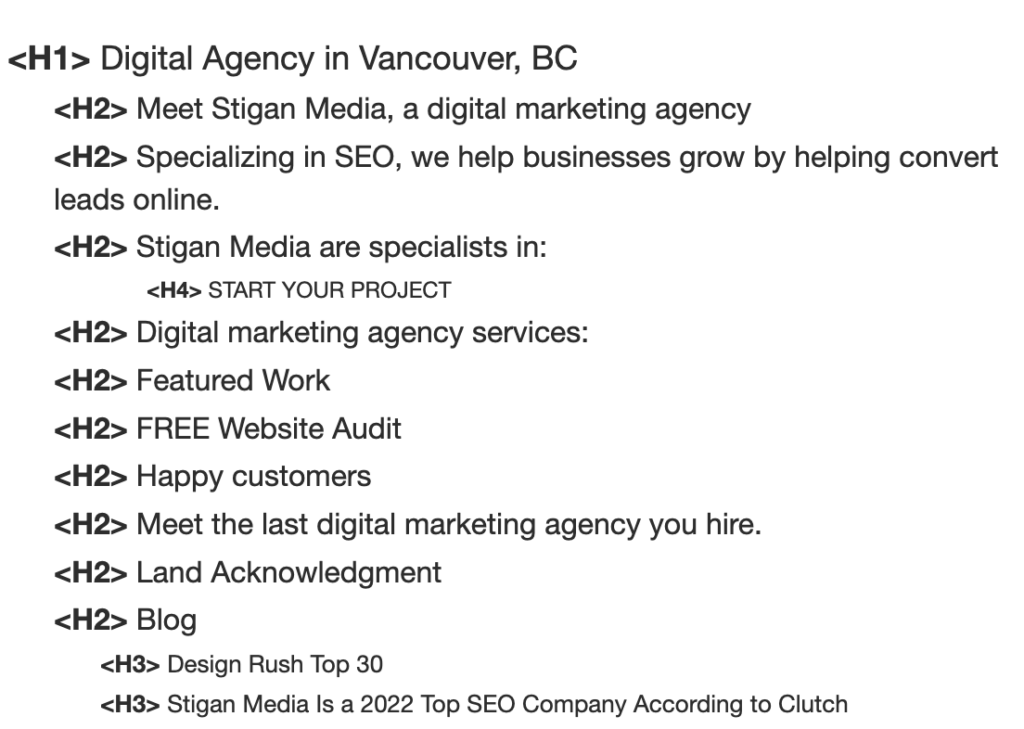Let’s Talk SEO!
Here are some tips on that will help your local businesses website appear in the SERPs when someone is searching for your product or service in a specific city or region. First, let’s go over the basic definition of a SERP: Search Engine Results Page.
A search engine results page (SERP) is the listing of results returned by a search engine in response to a keyword query. Basically the page you see when you Google Something. 🤗
Essentially, when someone ‘Searches’ for a keyword related to your business on a search engine like Google.ca, Yahoo.com or Bing.ca, the ‘Results’ that appear on the ‘Page’ are associated to the ‘Keywords” used in the search! Great SEO is having your website appear on the first page of a SERP, including in the map section (also known as a businesses GMB) and below this section. The listings displayed above this section are managed by GoogleAds and typically have up to 4 listings. You can identify these listings by the bolded ‘Ad‘ text to the left of the listings.
On-Page SEO
On-page SEO refers to the optimization techniques used to improve the ranking of a website on search engines through on-site optimization. This involves optimizing website content, HTML source code, and the website structure. On-page SEO includes optimizing web page titles, meta descriptions, header tags, images, and internal links. The content of a website should be relevant, engaging, and informative to its target audience. Additionally, websites should have a clear site structure and easy-to-navigate pages for visitors. Optimizing on-page elements will not only help search engines understand what a website is about, but it will also help visitors find what they are looking for.
Here are some key on-page SEO strategies that can help to optimize a website:
- Conduct keyword research and optimize web pages for relevant keywords
- Use descriptive, keyword-rich meta titles and meta descriptions for each page
- Use header tags (H1, H2, H3) to structure content and make it easy to read
- Optimize images with alt text and descriptive file names
- Use internal linking to help visitors navigate between pages on the site
- Ensure that web pages load quickly and are mobile-friendly
- Create high-quality, unique content that is engaging and informative
- Incorporate relevant, semantically related keywords throughout the content
- Use descriptive URLs that include the target keyword
- Optimize the site structure for easy navigation and user experience
- Include social sharing buttons to encourage visitors to share content on social media
- Regularly update and refresh content to keep it relevant and up-to-date.
These are just a few of the many on-page SEO strategies that can help to improve the visibility and ranking of a website in search engine results pages. It’s important to keep in mind that on-page optimization is an ongoing process, and consistent effort is required to achieve the desired results.
Why is On-Page SEO Important?
Search engines regularly update their algorithm to improve the user experience, so it is important for your website to include the proper structure and info to help your overall SEO strategy.
Off-Page SEO
Off-page SEO refers to the activities that are performed outside the website to improve its search engine ranking. This includes building links from other websites, promoting content on social media, and engaging with potential customers on forums and other online platforms. Off-page SEO is crucial for improving a website’s visibility and authority in the eyes of search engines. When other websites link to a website, it sends a signal to search engines that the site is credible and trustworthy. Social media is also a powerful tool for off-page SEO, as it can help to promote a website’s content and build relationships with potential customers. Overall, off-page SEO is a long-term strategy that requires consistent effort to see positive results.
Here are some key off-page SEO strategies that can help to improve a website’s visibility and authority:
- Build high-quality, relevant backlinks from other websites to the site
- Guest post on other relevant websites and include a link back to the site
- Promote content on social media to increase visibility and drive traffic to the site
- Participate in online forums and communities to engage with potential customers and build relationships
- Submit the website to relevant directories to increase its visibility and credibility
- Create and distribute high-quality, shareable infographics and other visual content
- Monitor and manage online reviews and ratings to build a positive online reputation
- Collaborate with influencers and industry experts to promote the site and build authority
- Monitor and analyze website traffic and adjust off-page strategies accordingly
- Leverage local SEO strategies, such as creating a Google My Business listing and building local citations.
Off-page SEO requires consistent effort and a long-term strategy to see results. Building high-quality backlinks and promoting content on social media are two of the most important off-page SEO strategies that can help to improve a website’s visibility and authority in the eyes of search engines.
Stigan Media is an award-winning web design & marketing agency specializing in WordPress, WebFlow, and Shopify. Our team focuses on SEO, PPC and conversion optimization strategies to help your company grow.







 Get in touch
Get in touch




